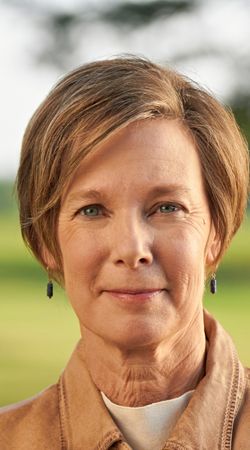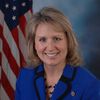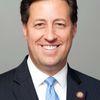North Carolina lieutenant gubernatorial election, 2024
|
← 2020
|
| North Carolina Lieutenant Governor |
|---|
| Democratic primary Republican primary Republican primary runoff General election |
| Election details |
| Filing deadline: December 15, 2023 |
| Primary: March 5, 2024 Primary runoff: May 14, 2024 General: November 5, 2024 Pre-election incumbent(s): Mark Robinson (R) |
| How to vote |
| Poll times: 6:30 a.m. to 7:30 p.m. Voting in North Carolina |
| Ballotpedia analysis |
| Federal and state primary competitiveness State executive elections in 2024 Impact of term limits in 2024 State government trifectas State government triplexes Ballotpedia's Election Analysis Hub, 2024 |
| North Carolina executive elections |
| Governor Lieutenant Governor |
Rachel Hunt (D), Hal Weatherman (R), Wayne Jones (Constitution Party), and Shannon Bray (L) ran in the general election for lieutenant governor of North Carolina on November 5, 2024. Incumbent Mark Robinson (R) ran for governor, leaving the lieutenant governor's seat open.
North Carolina's governor and lieutenant governor are elected separately and can belong to different parties. Heading into the 2024 election, Gov. Roy Cooper was a Democrat, and Lt. Gov. Robinson was a Republican. The governorship was also up for election in 2024, and the seat was open. Cooper was ineligible to run due to term limits.
The Raleigh News & Observer's Dawn Baumgartner Vaughan wrote, "If the lieutenant governor is from a different party, they are less likely to have any official events with the governor aside from monthly Council of State meetings. Those include the eight other statewide office holders, too. ... The job of the lieutenant governor doesn’t come with much power or control, but one important role is to preside over the state Senate as the Senate president. The LG only votes to break a tie, however."[1] The lieutenant governor is also acting governor when the governor is out of state and is first in the gubernatorial line of succession.[1]
Hunt was an attorney, was a state representative, and was a state senator at the time of the 2024 election.[2] Her campaign website stated, "Rachel Hunt’s priorities are investing in our public schools, expanding access to health care, and helping our local businesses thrive."[3]
Weatherman was the chief of staff for former Lt. Gov. Dan Forest (R) and former U.S. Rep. Sue Myrick (R).[2] Weatherman said on his campaign website, "My primary goal in seeking the office of Lt. Governor is to use the authority of the office to fundamentally remove the stigma our society has placed on working in the trades."[4]
At the time of the 2024 election, North Carolina had had a Republican lieutenant governor since 2012. The most recent Democrat to hold the seat was Walter Dalton, elected in 2008.
For more information about the primaries in this election, click on the links below:
- North Carolina lieutenant gubernatorial election, 2024 (March 5 Democratic primary)
- North Carolina lieutenant gubernatorial election, 2024 (March 5 Republican primary)
- North Carolina lieutenant gubernatorial election, 2024 (May 14 Republican primary runoff)
For information about the gubernatorial primaries, click on the following links:
- North Carolina gubernatorial election, 2024 (March 5 Democratic primary)
- North Carolina gubernatorial election, 2024 (March 5 Republican primary)
Candidates and election results
General election
General election for Lieutenant Governor of North Carolina
Rachel Hunt defeated Hal Weatherman, Shannon Bray, and Wayne Jones in the general election for Lieutenant Governor of North Carolina on November 5, 2024.
Candidate | % | Votes | ||
| ✔ |  | Rachel Hunt (D)  | 49.5 | 2,768,539 |
 | Hal Weatherman (R) | 47.6 | 2,663,183 | |
 | Shannon Bray (L) | 1.9 | 104,192 | |
 | Wayne Jones (Constitution Party) | 1.0 | 53,938 | |
| Total votes: 5,589,852 | ||||
 = candidate completed the Ballotpedia Candidate Connection survey. = candidate completed the Ballotpedia Candidate Connection survey. | ||||
| If you are a candidate and would like to tell readers and voters more about why they should vote for you, complete the Ballotpedia Candidate Connection Survey. | ||||
Do you want a spreadsheet of this type of data? Contact our sales team. | ||||
Withdrawn or disqualified candidates
- Jason Nicholson (Independent)
- Dee Watson (L)
Republican primary runoff election
Republican primary runoff for Lieutenant Governor of North Carolina
Hal Weatherman defeated Jim O'Neill in the Republican primary runoff for Lieutenant Governor of North Carolina on May 14, 2024.
Candidate | % | Votes | ||
| ✔ |  | Hal Weatherman | 74.3 | 96,600 |
 | Jim O'Neill | 25.7 | 33,448 | |
| Total votes: 130,048 | ||||
 = candidate completed the Ballotpedia Candidate Connection survey. = candidate completed the Ballotpedia Candidate Connection survey. | ||||
| If you are a candidate and would like to tell readers and voters more about why they should vote for you, complete the Ballotpedia Candidate Connection Survey. | ||||
Do you want a spreadsheet of this type of data? Contact our sales team. | ||||
Democratic primary election
Democratic primary for Lieutenant Governor of North Carolina
Rachel Hunt defeated Ben Clark and Mark H. Robinson in the Democratic primary for Lieutenant Governor of North Carolina on March 5, 2024.
Candidate | % | Votes | ||
| ✔ |  | Rachel Hunt  | 70.4 | 477,196 |
 | Ben Clark  | 16.5 | 111,836 | |
 | Mark H. Robinson | 13.2 | 89,247 | |
| Total votes: 678,279 | ||||
 = candidate completed the Ballotpedia Candidate Connection survey. = candidate completed the Ballotpedia Candidate Connection survey. | ||||
| If you are a candidate and would like to tell readers and voters more about why they should vote for you, complete the Ballotpedia Candidate Connection Survey. | ||||
Do you want a spreadsheet of this type of data? Contact our sales team. | ||||
Withdrawn or disqualified candidates
- Chris Rey (D)
Republican primary election
Republican primary for Lieutenant Governor of North Carolina
The following candidates ran in the Republican primary for Lieutenant Governor of North Carolina on March 5, 2024.
Candidate | % | Votes | ||
| ✔ |  | Hal Weatherman | 19.6 | 181,818 |
| ✔ |  | Jim O'Neill | 15.8 | 147,042 |
 | Deanna Ballard | 15.0 | 138,822 | |
 | Seth Woodall  | 11.0 | 102,492 | |
 | Sam Page | 10.2 | 94,810 | |
 | Allen Mashburn  | 9.0 | 83,550 | |
 | Jeffrey Elmore | 8.6 | 79,883 | |
 | Peter Boykin  | 3.5 | 32,126 | |
 | Rivera Douthit  | 2.5 | 23,398 | |
 | Ernest Reeves | 2.5 | 22,760 | |
 | Marlenis Hernandez Novoa  | 2.3 | 21,404 | |
| Total votes: 928,105 | ||||
 = candidate completed the Ballotpedia Candidate Connection survey. = candidate completed the Ballotpedia Candidate Connection survey. | ||||
| If you are a candidate and would like to tell readers and voters more about why they should vote for you, complete the Ballotpedia Candidate Connection Survey. | ||||
Do you want a spreadsheet of this type of data? Contact our sales team. | ||||
Libertarian primary election
The Libertarian primary election was canceled. Dee Watson advanced from the Libertarian primary for Lieutenant Governor of North Carolina.
Candidate profiles
This section includes candidate profiles that may be created in one of two ways: either the candidate completed Ballotpedia's Candidate Connection survey, or Ballotpedia staff may compile a profile based on campaign websites, advertisements, and public statements after identifying the candidate as noteworthy. For more on how we select candidates to include, click here.

Party: Democratic Party
Incumbent: No
Submitted Biography: "I am running for Lt. Governor to help make North Carolina a better place to live, work, and raise a family. My priorities are investing in our public schools, expanding access to health care, and helping our local businesses thrive."
![]()
This information was current as of the candidate's run for Lieutenant Governor of North Carolina in 2024.
Voting information
- See also: Voting in North Carolina
Campaign finance
- See also: Campaign finance
The section and tables below contain data from financial reports submitted to state agencies. The data is gathered and made available by Transparency USA.
Ballotpedia's Candidate Connection survey responses
Ballotpedia asks all federal, state, and local candidates to complete a survey and share what motivates them on political and personal levels. The section below shows responses from candidates in this race who completed Ballotpedia's Candidate Connection survey. Candidates are asked three required questions for this survey, but they may answer additional optional questions as well.

Survey responses from candidates in this race
Click on a candidate's name to visit their Ballotpedia page.
Note: Ballotpedia reserves the right to edit Candidate Connection survey responses. Any edits made by Ballotpedia will be clearly marked with [brackets] for the public. If the candidate disagrees with an edit, he or she may request the full removal of the survey response from Ballotpedia.org. Ballotpedia does not edit or correct typographical errors unless the candidate's campaign requests it.
| Collapse all

Rachel Hunt (D)
Everyone should have the right to make decisions about their healthcare in consultation with their doctor. The government should not be involved. Unfortunately, when it comes to women’s bodies, MAGA politicians in Raleigh care more about control than improving the quality of life for mothers and children. That’s why, as a State Senator, I’ve voted against their attempts to eliminate freedoms North Carolina women have had for more than 50 years. I support and trust women to make their own decisions. Further, I support making maternal life-saving measures safe and legal. I will continue to stand up for reproductive rights and fight for access to comprehensive reproductive healthcare.
I spent most of my childhood on a North Carolina farm, so I understand the unique challenges that our rural communities face. Working in the fields, taught me the value of hard work, resilience, and community. As your Lt. Governor, I'm committed to standing up for rural areas, ensuring they have a strong voice in the state government. Together, we will champion economic opportunities, access to quality education, and the good, affordable healthcare that rural North Carolinians deserve.

Rachel Hunt (D)

Rachel Hunt (D)

Rachel Hunt (D)
The Republican legislature weakened the Governor’s executive powers when responding to an emergency or natural disaster. Now, the Lieutenant Governor, along with all other members of the Council of State will need to reach a unanimous consensus before our sitting Governor can act. We need a government that functions when people need it most, not more red tape keeping them from getting the assistance they need. I pledge to support our Governor in whatever appropriate response is needed to effectively and efficiently respond to a crisis situation.
The Lieutenant Governor sits at the head of the North Carolina Senate and has tremendous influence over what issues are heard on the floor of the Senate chamber. As the next Lt. Governor, I’ll advocate for policies that support working parents.

Rachel Hunt (D)
Past elections
The section below details election results for this office in elections dating back to 2012.
2020
General election
General election for Lieutenant Governor of North Carolina
Mark K. Robinson defeated Yvonne Lewis Holley in the general election for Lieutenant Governor of North Carolina on November 3, 2020.
Candidate | % | Votes | ||
| ✔ |  | Mark K. Robinson (R) | 51.6 | 2,800,656 |
 | Yvonne Lewis Holley (D)  | 48.4 | 2,623,458 | |
| Total votes: 5,424,114 | ||||
 = candidate completed the Ballotpedia Candidate Connection survey. = candidate completed the Ballotpedia Candidate Connection survey. | ||||
| If you are a candidate and would like to tell readers and voters more about why they should vote for you, complete the Ballotpedia Candidate Connection Survey. | ||||
Do you want a spreadsheet of this type of data? Contact our sales team. | ||||
Democratic primary election
Democratic primary for Lieutenant Governor of North Carolina
The following candidates ran in the Democratic primary for Lieutenant Governor of North Carolina on March 3, 2020.
Candidate | % | Votes | ||
| ✔ |  | Yvonne Lewis Holley  | 26.6 | 309,274 |
 | Terry Van Duyn | 20.4 | 237,885 | |
 | Chaz Beasley | 18.9 | 219,503 | |
 | Allen Thomas Jr.  | 18.8 | 219,229 | |
 | Bill Toole  | 9.6 | 111,843 | |
| Ronald L. Newton | 5.7 | 65,970 | ||
| Total votes: 1,163,704 | ||||
 = candidate completed the Ballotpedia Candidate Connection survey. = candidate completed the Ballotpedia Candidate Connection survey. | ||||
| If you are a candidate and would like to tell readers and voters more about why they should vote for you, complete the Ballotpedia Candidate Connection Survey. | ||||
Do you want a spreadsheet of this type of data? Contact our sales team. | ||||
Republican primary election
Republican primary for Lieutenant Governor of North Carolina
The following candidates ran in the Republican primary for Lieutenant Governor of North Carolina on March 3, 2020.
Candidate | % | Votes | ||
| ✔ |  | Mark K. Robinson | 32.5 | 240,843 |
 | Andy Wells | 14.6 | 107,824 | |
 | Mark Johnson | 12.0 | 89,200 | |
| John Ritter | 11.5 | 85,023 | ||
 | Renee Ellmers | 6.8 | 50,526 | |
 | Greg Gebhardt  | 6.8 | 50,474 | |
 | Deborah Cochran  | 6.5 | 48,234 | |
 | Scott Stone  | 6.5 | 48,193 | |
| Buddy Bengel | 2.8 | 20,395 | ||
| Total votes: 740,712 | ||||
 = candidate completed the Ballotpedia Candidate Connection survey. = candidate completed the Ballotpedia Candidate Connection survey. | ||||
| If you are a candidate and would like to tell readers and voters more about why they should vote for you, complete the Ballotpedia Candidate Connection Survey. | ||||
Do you want a spreadsheet of this type of data? Contact our sales team. | ||||
2016
The general election for lieutenant governor was held on November 8, 2016.
Incumbent Dan Forest defeated Linda Coleman and Jacki Cole in the North Carolina lieutenant governor election.
| North Carolina Lieutenant Governor, 2016 | ||||
|---|---|---|---|---|
| Party | Candidate | Vote % | Votes | |
| Republican | 51.87% | 2,370,028 | ||
| Democratic | Linda Coleman | 45.28% | 2,068,741 | |
| Libertarian | Jacki Cole | 2.85% | 130,236 | |
| Total Votes | 4,569,005 | |||
| Source: ABC11 | ||||
}}
2012
Incumbent Walter Dalton (D) did not run for re-election. Dan Forest (R) defeated Linda Coleman (D) in the general election on November 6, 2012.
| Lieutenant Governor of North Carolina General Election, 2012 | ||||
|---|---|---|---|---|
| Party | Candidate | Vote % | Votes | |
| Democratic | Linda Coleman | 49.9% | 2,180,870 | |
| Republican | 50.1% | 2,187,728 | ||
| Total Votes | 4,368,598 | |||
| Election results via NC State Board of Elections | ||||
Election analysis
Click the tabs below to view information about demographics, past elections, and partisan control of the state.
- Presidential elections - Information about presidential elections in the state.
- Statewide elections - Information about recent U.S. Senate and gubernatorial elections in the state.
- State partisanship - The partisan makeup of the state's congressional delegation and state government.
- Demographics - Information about the state's demographics and how they compare to the country as a whole.
Cook PVI by congressional district
| Cook Political Report's Partisan Voter Index for North Carolina, 2024 | |||
|---|---|---|---|
| District | Incumbent | Party | PVI |
| North Carolina's 1st | Donald Davis | R+1 | |
| North Carolina's 2nd | Deborah Ross | D+15 | |
| North Carolina's 3rd | Gregory Murphy | R+11 | |
| North Carolina's 4th | Valerie Foushee | D+21 | |
| North Carolina's 5th | Virginia Foxx | R+10 | |
| North Carolina's 6th | Kathy Manning | R+11 | |
| North Carolina's 7th | David Rouzer | R+8 | |
| North Carolina's 8th | Dan Bishop | R+11 | |
| North Carolina's 9th | Richard Hudson | R+9 | |
| North Carolina's 10th | Patrick McHenry | R+10 | |
| North Carolina's 11th | Chuck Edwards | R+8 | |
| North Carolina's 12th | Alma Adams | D+23 | |
| North Carolina's 13th | Wiley Nickel | R+11 | |
| North Carolina's 14th | Jeff Jackson | R+11 | |
2020 presidential results by 2024 congressional district lines
| 2020 presidential results in congressional districts based on 2024 district lines, North Carolina[5] | ||||
|---|---|---|---|---|
| District | Joe Biden |
Donald Trump | ||
| North Carolina's 1st | 50.4% | 48.8% | ||
| North Carolina's 2nd | 66.9% | 31.5% | ||
| North Carolina's 3rd | 40.7% | 58.0% | ||
| North Carolina's 4th | 72.4% | 26.2% | ||
| North Carolina's 5th | 41.8% | 57.2% | ||
| North Carolina's 6th | 41.2% | 57.5% | ||
| North Carolina's 7th | 43.9% | 54.9% | ||
| North Carolina's 8th | 40.6% | 58.3% | ||
| North Carolina's 9th | 42.4% | 56.3% | ||
| North Carolina's 10th | 41.4% | 57.4% | ||
| North Carolina's 11th | 43.8% | 54.8% | ||
| North Carolina's 12th | 74.4% | 24.2% | ||
| North Carolina's 13th | 40.7% | 57.9% | ||
| North Carolina's 14th | 41.4% | 57.5% | ||
2012-2020
How a state's counties vote in a presidential election and the size of those counties can provide additional insights into election outcomes at other levels of government including statewide and congressional races. Below, four categories are used to describe each county's voting pattern over the 2012, 2016, and 2020 presidential elections: Solid, Trending, Battleground, and New. Click [show] on the table below for examples:
| County-level voting pattern categories | |||||||
|---|---|---|---|---|---|---|---|
| Democratic | |||||||
| Status | 2012 | 2016 | 2020 | ||||
| Solid Democratic | D | D | D | ||||
| Trending Democratic | R | D | D | ||||
| Battleground Democratic | D | R | D | ||||
| New Democratic | R | R | D | ||||
| Republican | |||||||
| Status | 2012 | 2016 | 2020 | ||||
| Solid Republican | R | R | R | ||||
| Trending Republican | D | R | R | ||||
| Battleground Republican | R | D | R | ||||
| New Republican | D | D | R | ||||
Following the 2020 presidential election, 47.1% of North Carolinians lived in one of the state's 22 Solid Democratic counties, which voted for the Democratic presidential candidate in every election from 2012 to 2020, and 46.3% lived in one of 68 Solid Republican counties. Overall, North Carolina was Solid Republican, having voted for Mitt Romney (R) in 2012, Donald Trump (R) in 2016, and Donald Trump (R) in 2020. Use the table below to view the total number of each type of county in North Carolina following the 2020 election as well as the overall percentage of the state population located in each county type.
| North Carolina county-level statistics, 2020 | |||||||
|---|---|---|---|---|---|---|---|
| Solid Democratic | 22 | 47.1% | |||||
| Solid Republican | 68 | 46.3% | |||||
| Trending Republican | 6 | 2.7% | |||||
| New Democratic | 1 | 2.2% | |||||
| Battleground Democratic | 1 | 0.9% | |||||
| Trending Democratic | 1 | 0.5% | |||||
| New Republican | 1 | 0.3% | |||||
| Total voted Democratic | 25 | 50.7% | |||||
| Total voted Republican | 75 | 49.3% | |||||
Historical voting trends
North Carolina presidential election results (1900-2020)
- 18 Democratic wins
- 13 Republican wins
| Year | 1900 | 1904 | 1908 | 1912 | 1916 | 1920 | 1924 | 1928 | 1932 | 1936 | 1940 | 1944 | 1948 | 1952 | 1956 | 1960 | 1964 | 1968 | 1972 | 1976 | 1980 | 1984 | 1988 | 1992 | 1996 | 2000 | 2004 | 2008 | 2012 | 2016 | 2020 |
|---|---|---|---|---|---|---|---|---|---|---|---|---|---|---|---|---|---|---|---|---|---|---|---|---|---|---|---|---|---|---|---|
| Winning Party | D | D | D | D | D | D | D | R | D | D | D | D | D | D | D | D | D | R | R | D | R | R | R | R | R | R | R | D | R | R | R |
This section details the results of the five most recent U.S. Senate and gubernatorial elections held in the state.
U.S. Senate elections
The table below details the vote in the five most recent U.S. Senate races in North Carolina.
| U.S. Senate election results in North Carolina | ||
|---|---|---|
| Race | Winner | Runner up |
| 2022 | 50.5% |
47.3% |
| 2020 | 48.7% |
46.9% |
| 2016 | 51.1% |
45.3% |
| 2014 | 48.8% |
47.3% |
| 2010 | 55.0% |
42.9% |
| Average | 50.8 | 45.9 |
Gubernatorial elections
- See also: Governor of North Carolina
The table below details the vote in the five most recent gubernatorial elections in North Carolina.
| Gubernatorial election results in North Carolina | ||
|---|---|---|
| Race | Winner | Runner up |
| 2020 | 51.5% |
47.0% |
| 2016 | 49.0% |
48.8% |
| 2012 | 54.6% |
43.2% |
| 2008 | 50.3% |
46.9% |
| 2004 | 55.6% |
42.9% |
| Average | 52.2 | 45.8 |
Congressional delegation
The table below displays the partisan composition of North Carolina's congressional delegation as of May 2024.
| Congressional Partisan Breakdown from North Carolina | |||
|---|---|---|---|
| Party | U.S. Senate | U.S. House | Total |
| Democratic | 0 | 4 | 4 |
| Republican | 2 | 10 | 12 |
| Independent | 0 | 0 | 0 |
| Vacancies | 0 | 0 | 0 |
| Total | 2 | 14 | 16 |
State executive
The table below displays the officeholders in North Carolina's top four state executive offices as of May 2024.
| State executive officials in North Carolina, May 2024 | |
|---|---|
| Office | Officeholder |
| Governor | |
| Lieutenant Governor | |
| Secretary of State | |
| Attorney General | |
State legislature
North Carolina State Senate
| Party | As of February 2024 | |
|---|---|---|
| Democratic Party | 20 | |
| Republican Party | 30 | |
| Other | 0 | |
| Vacancies | 0 | |
| Total | 50 | |
North Carolina House of Representatives
| Party | As of February 2024 | |
|---|---|---|
| Democratic Party | 48 | |
| Republican Party | 72 | |
| Other | 0 | |
| Vacancies | 0 | |
| Total | 120 | |
Trifecta control
The table below shows the state's trifecta status from 1992 until the 2024 election.
North Carolina Party Control: 1992-2024
Fourteen years of Democratic trifectas • Four years of Republican trifectas
Scroll left and right on the table below to view more years.
| Year | 92 | 93 | 94 | 95 | 96 | 97 | 98 | 99 | 00 | 01 | 02 | 03 | 04 | 05 | 06 | 07 | 08 | 09 | 10 | 11 | 12 | 13 | 14 | 15 | 16 | 17 | 18 | 19 | 20 | 21 | 22 | 23 | 24 |
|---|---|---|---|---|---|---|---|---|---|---|---|---|---|---|---|---|---|---|---|---|---|---|---|---|---|---|---|---|---|---|---|---|---|
| Governor | R | D | D | D | D | D | D | D | D | D | D | D | D | D | D | D | D | D | D | D | D | R | R | R | R | D | D | D | D | D | D | D | D |
| Senate | D | D | D | D | D | D | D | D | D | D | D | D | D | D | D | D | D | D | D | R | R | R | R | R | R | R | R | R | R | R | R | R | R |
| House | D | D | D | R | R | R | R | D | D | D | D | D | D | D | D | D | D | D | D | R | R | R | R | R | R | R | R | R | R | R | R | R | R |
The table below details demographic data in North Carolina and compares it to the broader United States as of 2022.
| Demographic Data for North Carolina | ||
|---|---|---|
| North Carolina | United States | |
| Population | 10,439,388 | 331,449,281 |
| Land area (sq mi) | 48,623 | 3,531,905 |
| Race and ethnicity** | ||
| White | 65% | 65.9% |
| Black/African American | 20.9% | 12.5% |
| Asian | 3.1% | 5.8% |
| Native American | 1% | 0.8% |
| Pacific Islander | 0.1% | 0.2% |
| Other (single race) | 4% | 6% |
| Multiple | 5.9% | 8.8% |
| Hispanic/Latino | 10% | 18.7% |
| Education | ||
| High school graduation rate | 89.4% | 89.1% |
| College graduation rate | 33.9% | 34.3% |
| Income | ||
| Median household income | $66,186 | $75,149 |
| Persons below poverty level | 9.5% | 8.8% |
| Source: population provided by U.S. Census Bureau, "Decennial Census" (2020). Other figures provided by U.S. Census Bureau, "American Community Survey" (5-year estimates 2017-2022). | ||
| **Note: Percentages for race and ethnicity may add up to more than 100 percent because respondents may report more than one race and the Hispanic/Latino ethnicity may be selected in conjunction with any race. Read more about race and ethnicity in the census here. | ||
See also
| North Carolina | State Executive Elections | News and Analysis |
|---|---|---|
|
|
|
|
External links
Footnotes
- ↑ 1.0 1.1 Raleigh News & Observer, "Here are the candidates to be the next NC lieutenant governor, and what the job means," October 23, 2024
- ↑ 2.0 2.1 Asheville Citizen Times, "North Carolina Lieutenant Governor Candidates," September 17, 2024
- ↑ Rachel Hunt 2024 campaign website, "Issues," accessed November 4, 2024
- ↑ Hal Weatherman 2024 campaign website, "About," accessed November 4, 2024
- ↑ Daily Kos, "Daily Kos Elections' presidential results by congressional district for 2020, 2016, and 2012," accessed December 15, 2023









